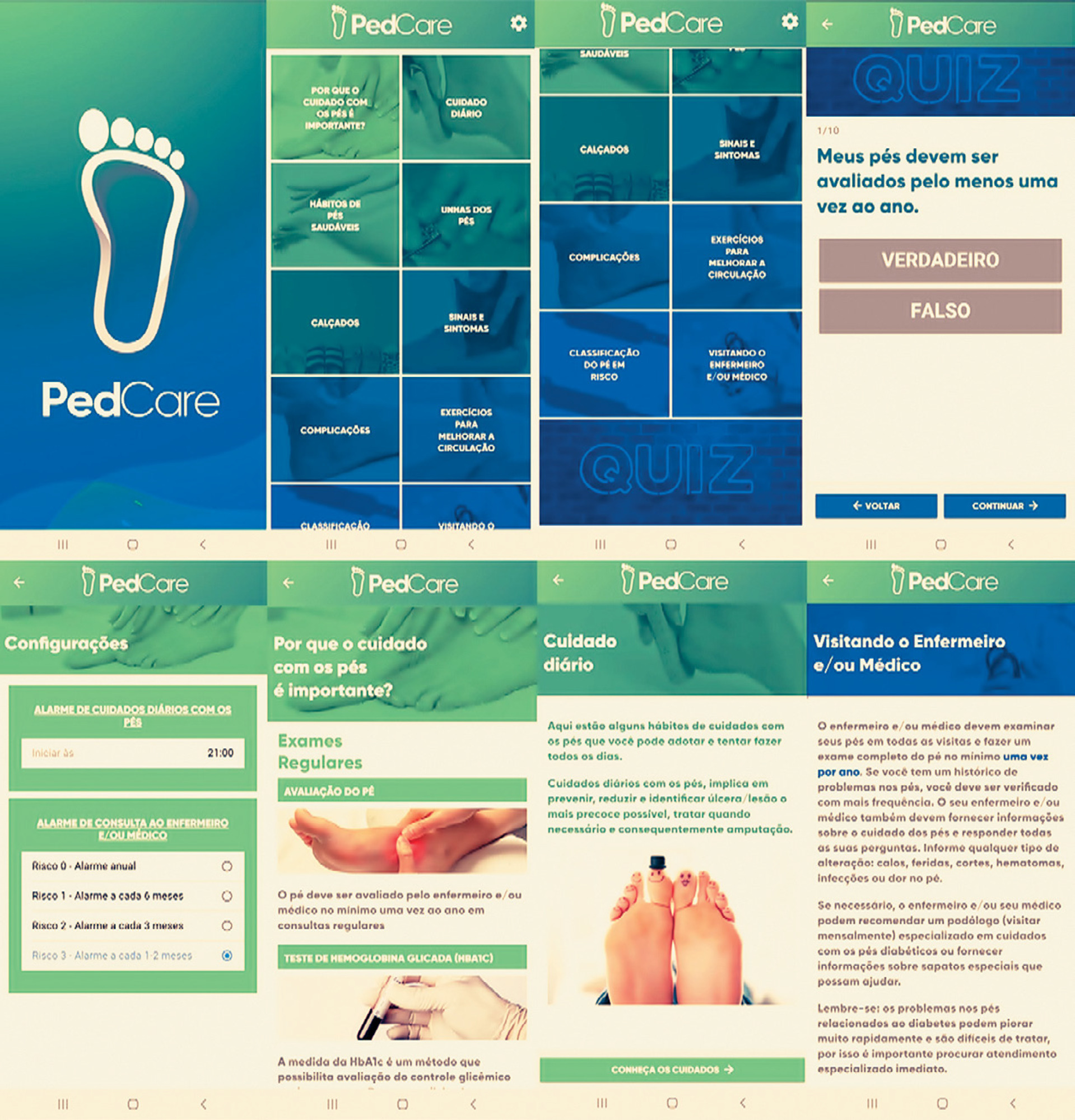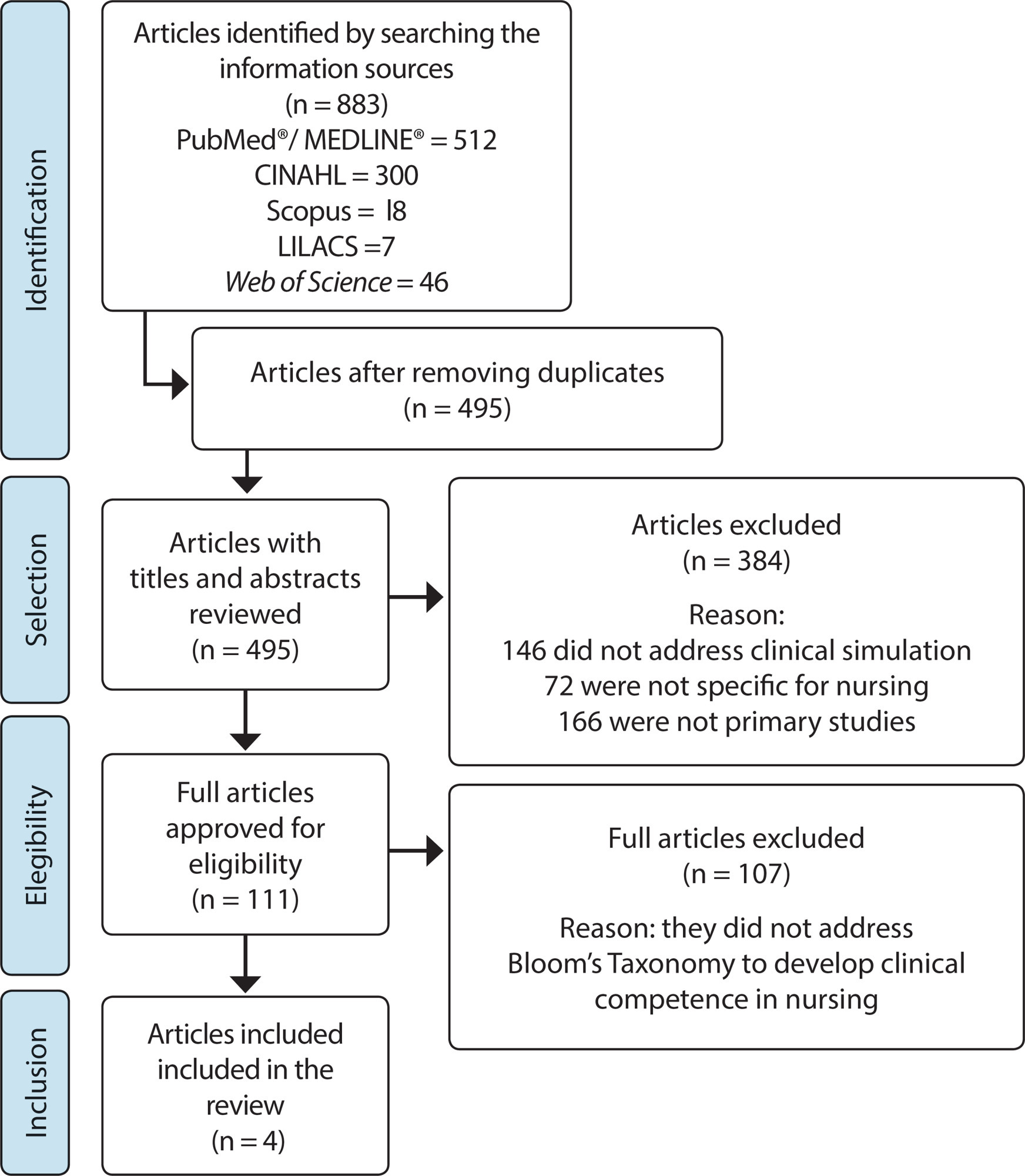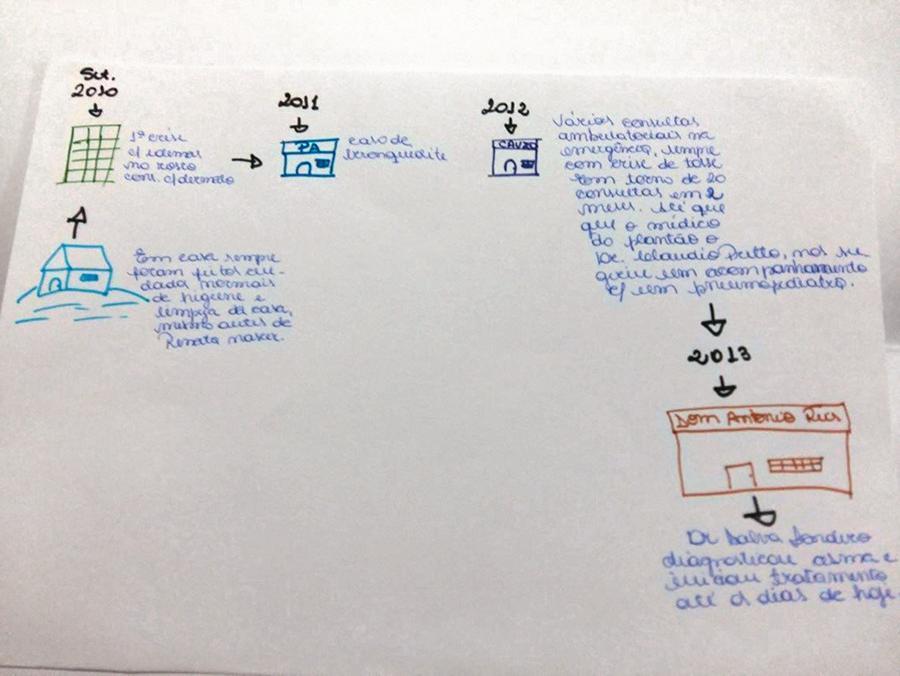-
01-01-2016
ERRATUM
Revista Brasileira de Enfermagem. 2016;69(5):1002-1002
Abstract
ERRATUM
Revista Brasileira de Enfermagem. 2016;69(5):1002-1002
DOI 10.1590/0034-7167.20166905e01
Views0Article “Alcohol and alcoholism: attitudes of nursing students”, with number of DOI: http://dx.doi.org/10.1590/S0034-71672013000100013, published in the journal Revista Brasileira de Enfermagem, v66(1):84-9, page 89 that read: “18. Miranda SP, Vargas D. Satisfação de pacientes de um centro de atenção Psicossocial álcool e drogas com o atendimento do enfermeiro. SMAD, Rev Eletrônica Saúde Mental Alcool Drog […]See more -
01-01-2016
Research methodology for nursing and health: a book review
Revista Brasileira de Enfermagem. 2016;69(5):1000-1001
Abstract
Research methodology for nursing and health: a book review
Revista Brasileira de Enfermagem. 2016;69(5):1000-1001
DOI 10.1590/0034-7167-2015-0135
Views1For those interested in nursing and health, the book entitled “Research methodology for nursing and health: from theory to practice”() was released in October 2015, at the 67th Brazilian Congress of Nursing, sponsored by National ABEn. The interest emerged from two organizers: Dr. Maria Ribeiro Lacerda (UFPR) and Dr. Regina Gema Santini Costerano (UNIFRA). Forty-seven […]See more -
01-01-2016
Violence in the workplace in Nursing: consequences overview
Revista Brasileira de Enfermagem. 2016;69(5):996-999
Abstract
Violence in the workplace in Nursing: consequences overview
Revista Brasileira de Enfermagem. 2016;69(5):996-999
DOI 10.1590/0034-7167-2015-0133
Views0See moreABSTRACT
Objective:
to reflect on the consequences of workplace violence experienced by nursing professionals.
Methods:
this is a reflection paper based on recent publications related to the subject, particularly researches carried out in Brazil and in other countries.
Results:
exposure to workplace violence has been associated with health problems in nursing professionals, which may be physical damage, emotional manifestations, and psychic disorders. It also affects the employee performance, his or her family and social interactions.
Conclusion:
this phenomenon is potentially noxious and costly, for it leads to suffering, illness, absence from work, and even death. This reflection calls attention moreover to the importance of a safe and adequate health care work environment.
-
REFLECTION01-01-2016
Construcción de la enfermera de práctica avanzada en Catalunya (España)
Revista Brasileira de Enfermagem. 2016;69(5):991-995
Abstract
REFLECTIONConstrucción de la enfermera de práctica avanzada en Catalunya (España)
Revista Brasileira de Enfermagem. 2016;69(5):991-995
DOI 10.1590/0034-7167.2016690507
Views0RESUMEN
El desarrollo de la enfermera de práctica avanzada (EPA) ha supuesto un reto para las enfermeras en países como EE.UU., Canadá, Gran Bretaña y Australia, entre otros, y desde hace escasos años está siendo considerada en Catalunya y España como un sistema para desarrollar nuevos roles que aporten eficacia y eficiencia al sistema sanitario. El presente artículo pretende conceptualizar la EPA y los modelos de referencia así como contextualizar y reflexionar sobre la EPA en Catalunya, desde el punto de vista de formación y de la implantación de los denominados nuevos roles de enfermería, asimilándolos a la práctica avanzada.
Keywords:Competencia ClínicaEnfermeríaEnfermería de Práctica AvanzadaPráctica ProfesionalRol de la EnfermeraSee more -
01-01-2016
Developing the Advanced Practice Nurse in Catalonia
Revista Brasileira de Enfermagem. 2016;69(5):991-995
Abstract
Developing the Advanced Practice Nurse in Catalonia
Revista Brasileira de Enfermagem. 2016;69(5):991-995
DOI 10.1590/0034-7167.2016690507
Views0See moreABSTRACT
The development of advanced practice nurses (APN) has proved a challenge for nurses in countries such as the USA, Canada, Great Britain, and Australia among others. It is only in recent years that the system has been considered in Catalonia and Spain as a way to develop new roles to bring effectiveness and efficiency to the health system. From the standpoint of training and implementation of the above-mentioned new nursing roles, the following article aims to conceptualise APN and its reference models, as well as to contextualise and reflect on APN in Catalonia in order to assimilate them into advanced practice.
-
01-01-2016
International academic mobility in nursing education: an experience report
Revista Brasileira de Enfermagem. 2016;69(5):986-990
Abstract
International academic mobility in nursing education: an experience report
Revista Brasileira de Enfermagem. 2016;69(5):986-990
DOI 10.1590/0034-7167-2015-0128
Views0See moreABSTRACT
Objective:
report the experience of international academic mobility in Ireland through the program Science Without Borders during undergraduate education in nursing.
Method:
a report of experience presented in chronological order, with a descriptive nature.
Results:
the opportunity to know and be able to discuss questions regarding health and nursing in Ireland allowed the review of concepts and a more reflective perspective regarding nursing practices. Additionally, the exchange promoted personal strengthening regarding the confrontation and solution of problems, development of technical and scientific abilities, improvement of linguistic competences and construction of personality, independence and maturity.
Conclusion:
regarding such constructive and enriching experience that this mobility provides to students, to the governing authorities, to the population and to Brazilian nursing, sharing this experience is expected to serve as encouragement for those who search for new horizons, with the objective of adding knowledge for their personal and professional life.
-
01-01-2016
Online training for health professionals in three regions of Brazil
Revista Brasileira de Enfermagem. 2016;69(5):981-985
Abstract
Online training for health professionals in three regions of Brazil
Revista Brasileira de Enfermagem. 2016;69(5):981-985
DOI 10.1590/0034-7167.2016690506
Views0See moreABSTRACT
Objective:
to describe online training experience aimed at professionals working in the public health service in 27 Neonatal and Pediatric Intensive Care Units, and to reflect concerning the training process and possible improvements in this process.
Method:
this is an experience report study about the online training with multidisciplinary content, planned from the situational diagnosis of 27 institutions. The training target set was 10 participants per institution and per module, including the following topics: Indicators of Quality as a Management Tool, Hand Hygiene, Patient Safety, Intravenous Therapy and Patients’ Chart Record.
Results:
a total of 2,071 active students in the modules, with 1,046 approved. The mean of 76 students per module exceeded the target set.
Conclusion:
experience has shown that online training is comprehensive as a potential tool for the professional technical development and digital inclusion. The online learning system becomes weakened if participants are unaware of the technological resources.
-
01-01-2016
Technologies in intensive care: causes of adverse events and implications to nursing
Revista Brasileira de Enfermagem. 2016;69(5):972-980
Abstract
Technologies in intensive care: causes of adverse events and implications to nursing
Revista Brasileira de Enfermagem. 2016;69(5):972-980
DOI 10.1590/0034-7167.2016690505
Views0See moreABSTRACT
Objective:
to identify the causes of adverse events affecting clients resulting from the use of equipment in intensive care services; to point out the main recommendations for clinical practice to minimize these events and, then, discuss the implications to nursing care.
Method:
integrative and descriptive review on the SciELO, Medline, LILACS, and PubMed databases. Articles were selected based on the inclusion criteria and the structured instrument was applied.
Results:
altogether, 11 articles were selected where three evidence units were outstanding: Equipment failure; inadequate use of equipment; and team failure. Permanent education of professionals; evaluation of production and availability of equipment; and use of checklists are recommended.
Conclusion:
preventing adverse events related to equipment is one of the nursing responsibilities and requires the establishment of defensive barriers to prevent these.
-
REVIEW06-01-2020
Access of the black population to health services: integrative review
Revista Brasileira de Enfermagem. 2020;73(4):e20180834
Abstract
REVIEWAccess of the black population to health services: integrative review
Revista Brasileira de Enfermagem. 2020;73(4):e20180834
DOI 10.1590/0034-7167-2018-0834
Views1See moreABSTRACT
Objectives:
demonstrate and discuss how the black population’s access to health services occurs
Methods:
integrative literature review with the following question: How does the black population’s access to health services occur? The search was carried out in the Scholar, LILACS and SciELO databases and used the descriptor “access to health services” and the term “population,” resulting in a sample with twelve articles.
Results:
studies show that the difficulty of access is a fundamental factor for the quality of life of people, directly compromising preventive services, especially for women’s health and, in addition, it has significant impact on the illness process of the black population within its particularities.
Final Considerations:
several limiting factors compromise the black population’s access to health services, including institutional and structural factors

-
REVIEW11-06-2020
Transitional care to caregivers of dependent older people: an integrative literature review
Revista Brasileira de Enfermagem. 2020;73:e20200394
Abstract
REVIEWTransitional care to caregivers of dependent older people: an integrative literature review
Revista Brasileira de Enfermagem. 2020;73:e20200394
DOI 10.1590/0034-7167-2020-0394
Views1See moreABSTRACT
Objective:
To identify the needs of caregivers of dependent older people related to self-care in the transition from hospital to home.
Methods:
Integrative literature review that followed a predefined protocol, carried out from March to May 2019 in the platforms EBSCO, B-On, Scopus, Web of Science, and Joanna Briggs Institute. Descriptors and eligibility criteria were defined for the bibliographic sample, which was ten articles. The search was limited to articles published between 2015 and 2019 to guarantee evidence topicality.
Results:
The needs of caregivers related to transitional care can be grouped into five categories: needs in the transition into the role of caregiver; needs related to self-care of caregivers themselves; health needs; economic needs; and social and collective needs.
Final considerations:
The work developed by nurses regarding transitional care of caregivers must have two focuses: managing care provided to dependent older people and managing the needs of caregivers and the care offered to them.

-
REVIEW10-19-2020
Validation methods of nursing protocols: an integrative review
Revista Brasileira de Enfermagem. 2020;73:e20200050
Abstract
REVIEWValidation methods of nursing protocols: an integrative review
Revista Brasileira de Enfermagem. 2020;73:e20200050
DOI 10.1590/0034-7167-2020-0050
Views0See moreABSTRACT
Objective:
to identify scientific production about validation methods of nursing care protocols.
Method:
an integrative review with search at Scielo, Pubmed/MEDLINE, Virtual Health Library, Web of Science, Scopus, and EBSCOhost. The descriptors “validation studies”, “validation studies as topic”, “protocols”, “clinical protocols”, “practice guidelines as topic”, “nursing” and “nursing assessment” and the uncontrolled descriptor “validation” were used.
Results:
thirty-two articles were selected, most of them Brazilian. Content validation by experts was the most frequent method, with no consensus on the number of participants for the process. The collection instruments were mostly created by the authors. Data analysis was performed using descriptive statistics and Content Validity Index, with a variable consensus rate in the analyzed articles.
Conclusion:
protocols validated by experts are robust tools for use in clinical practice, with methodological rigor in development essential for its quality.

-
ORIGINAL ARTICLE05-24-2021
PEDCARE: validation of a mobile application on diabetic foot self-care
Revista Brasileira de Enfermagem. 2021;74:e20200856
Abstract
ORIGINAL ARTICLEPEDCARE: validation of a mobile application on diabetic foot self-care
Revista Brasileira de Enfermagem. 2021;74:e20200856
DOI 10.1590/0034-7167-2020-0856
Views0See moreABSTRACT
Objective:
to describe the process of validating a multimedia application on a mobile platform to promote foot care for people with diabetes.
Method:
a technological production and methodological type study. Content and appearance were validated by 39 judges (29 nursing judges and ten information and communication technology judges and 15 people from the target audience).
Results:
nursing judges made it possible to validate the material with a total Content Validity Index of 0.95, a non-significant binomial test for most items and Cronbach’s alpha of 0.92, information and communication technology judges with Suitability Assessment of Materials of 99.2% and the target audience with an agreement index of 98%.
Conclusion:
the application proved to be valid and reliable for use in clinical practice as an educational technology to promote foot care for people with diabetes.

-
EXPERIENCE REPORT04-09-2020
Implementation of an Artificial Intelligence Algorithm for sepsis detection
Revista Brasileira de Enfermagem. 2020;73(3):e20180421
Abstract
EXPERIENCE REPORTImplementation of an Artificial Intelligence Algorithm for sepsis detection
Revista Brasileira de Enfermagem. 2020;73(3):e20180421
DOI 10.1590/0034-7167-2018-0421
Views0See moreABSTRACT
Objectives:
to present the nurses’ experience with technological tools to support the early identification of sepsis.
Methods:
experience report before and after the implementation of artificial intelligence algorithms in the clinical practice of a philanthropic hospital, in the first half of 2018.
Results:
describe the motivation for the creation and use of the algorithm; the role of the nurse in the development and implementation of this technology and its effects on the nursing work process.
Final Considerations:
technological innovations need to contribute to the improvement of professional practices in health. Thus, nurses must recognize their role in all stages of this process, in order to guarantee safe, effective and patient-centered care. In the case presented, the participation of the nurses in the technology incorporation process enables a rapid decision-making in the early identification of sepsis.
-
REVIEW03-24-2021
Development of clinical competence in nursing in simulation: the perspective of Bloom’s taxonomy
Revista Brasileira de Enfermagem. 2021;74(1):e20200135
Abstract
REVIEWDevelopment of clinical competence in nursing in simulation: the perspective of Bloom’s taxonomy
Revista Brasileira de Enfermagem. 2021;74(1):e20200135
DOI 10.1590/0034-7167-2020-0135
Views0See moreABSTRACT
Objectives:
to investigate the scientific evidence on the use of Bloom’s taxonomy for developing competence in nursing professionals and students in clinical simulation.
Methods:
integrative review of the National Library of Medicine (NLM), National Institutes of Health (NIH), Cumulative Index to Nursing and Allied Health Literature (CINAHL), Latin American and Caribbean Literature in Health Sciences (LILACS), Web of Science and SCOPUS databases, using the Rayyan application.
Results:
a total of 871 studies were identified; four composed the sample. The development of clinical competence occurred through the coordination of knowledge, skills, and attitudes. To develop the cognitive domain, the objectives of knowledge and comprehension of the Bloom’s taxonomy were mobilized. The psychomotor domain required development of the skills demanded by the proposed clinical care. The affective domain was developed through will and motivation to learn.
Conclusions:
it is possible to develop clinical competence in nursing by adopting Bloom’s taxonomy in each phase of clinical simulation.

-
03-27-2020
Coronavirus 2020
Revista Brasileira de Enfermagem. 2020;73(2):e2020n2
Abstract
Coronavirus 2020
Revista Brasileira de Enfermagem. 2020;73(2):e2020n2
DOI 10.1590/0034-7167-2020730201
Views0Emerging and reemerging infectious diseases are constant challenges for public health worldwide. Recent cases of pneumonia of unknown cause in Wuhan, China, have led to the discovery of a new type of Coronavirus (2019-nCoV), which are enveloped RNA viruses, commonly found in humans, other mammals and birds, capable of causing respiratory, enteric, hepatic, and neurological […]See more -
ORIGINAL ARTICLE12-13-2019
Accessibility of children with special health needs to the health care network
Revista Brasileira de Enfermagem. 2019;72:65-71
Abstract
ORIGINAL ARTICLEAccessibility of children with special health needs to the health care network
Revista Brasileira de Enfermagem. 2019;72:65-71
DOI 10.1590/0034-7167-2017-0899
Views0See moreABSTRACT
Objective:
To know how children with special health needs access the health care network.
Method:
This is a qualitative research of descriptive-exploratory type, developed using semi-structured interviews mediated by the Talking Map design. Participants were 19 family caregivers of these children in two Brazilian municipalities. Data were submitted to inductive thematic analysis.
Results:
Difficulties were mentioned from the diagnosis moment to the specialized follow-up, something represented by the itinerary of the c hild and his/her family in the search for the definition of the medical diagnosis and the access to a specialized professional; a gap between the children’s needs and the care offered was observed in primary health care.
Conclusion:
The access of children with special health needs is filled with obstacles such as slowness in the process of defining the child’s diagnosis and referral to a specialist. Primary health care services were replaced by care in emergency care units.

Search
Search in:
Nuvem de Tags
Adolescente (85) Atenção Primária à Saúde (239) COVID-19 (91) Criança (91) Cuidados de Enfermagem (269) Educação em Enfermagem (151) Educação em Saúde (139) Enfermagem (930) Enfermagem Pediátrica (86) Estudantes de Enfermagem (77) Estudos de Validação (131) Família (87) Idoso (208) Promoção da Saúde (99) Qualidade de Vida (104) Saúde do Trabalhador (86) Saúde Mental (145) Saúde Pública (82) Segurança do Paciente (150) Tecnologia Educacional (100)



